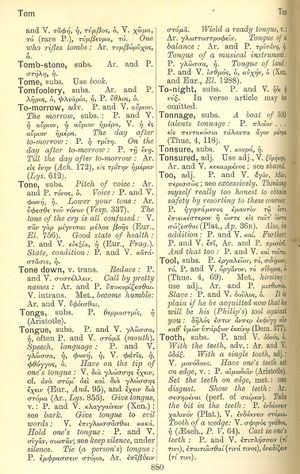tongue
τούτου δὲ συμβαίνοντος ἀναγκαῖον γίγνεσθαι πάροδον καὶ τροπὰς τῶν ἐνδεδεμένων ἄστρων → but if this were so, there would have to be passings and turnings of the fixed stars
English > Greek (Woodhouse)
subs.
P. and V. γλῶσσα, ἡ, often P. and V. στόμα (mouth).
Speech, language: P. and V. γλῶσσα, ἡ, φωνή, ἡ, V. φάτις, ἡ, φθόγγος, ὁ.
Have on the tip of one's tongue: V. διὰ γλώσσης ἔχειν, cf. ἀνὰ στόμʼ ἀεὶ καὶ διὰ γλώσσης ἔχειν (Eur., And. 95), and ἔχειν διὰ στόμα (Ar., Lys. 855).
Give tongue, v.: P. and V. κλαγγαίνειν (Xen.); see bark.
Give tongue to evil words: V. ἐπιγλωσσᾶσθαι κακά.
Hold one's tongue: P. and V. σιγᾶν, σιωπᾶν; see keep silence, under silence.
Tie (a person's) tongue: P. ἐμφράσσειν στόμα, Ar. ἐπιβύειν στόμα.
Wield a ready tongue, v.: Ar. γλωττοστροφεῖν.
Tongue of a balance: Ar. and P. τρυτάνη, ἡ.
Tongue of a musical instrument. P. γλῶσσα, ἡ.
Tongue of land: P. and V. ἰσθμός, ὁ, αὐχήν, ὁ (Xen. and Eur., El. 1288).

